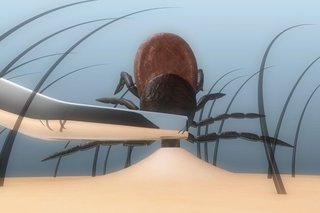You can treat most insect bites and stings at home. They usually get better in a few hours or days.
Removing stingers, ticks or caterpillar hairs
The first thing you need to do is remove the stinger, tick or caterpillar hairs if they are left in or on your skin.
Treating your symptoms at home
If there's nothing on or in your skin, or you've removed what was on your skin, wash the affected area with soap and water. This will help lower the chance of infection.
If the insect bite or sting is not serious, there are other things you can do at home to ease your symptoms.
Do
-
put a cold compress on the bite or sting for at least 20 minutes if it's swollen
-
keep the area raised to reduce swelling
Don't
-
do not scratch the bite or sting or burst any blisters - it could get infected
-
do not use home remedies such as bicarbonate of soda and vinegar to treat the bite or sting
Medicines to help ease your symptoms
Ask your pharmacist about medicines that can help ease the symptoms of a bite or sting, such as:
- antihistamines - these are commonly used, but do not always work well
- steroid creams
- painkillers, such as ibuprofen or paracetamol - do not give aspirin to children under age 16
If the swelling at the bite or sting is severe, your GP may prescribe a short course of steroid tablets, such as prednisolone. You take these for 3 to 5 days.
If you have an allergic reaction after being bitten or stung, your GP may:
- prescribe you an adrenaline pen (an auto-injector)
- refer you to an allergy clinic for further tests and treatment
Emergency action required: Call 112 or 999 or go to your nearest emergency department (ED) if
you have symptoms of a serious allergic reaction, such as:
- wheezing or difficulty breathing
- a swollen face, mouth, lips, tongue or throat
- eye pain or conjunctivitis
- nausea or vomiting
- a fast heart rate
- dizziness or feeling faint
- difficulty swallowing
- loss of consciousness
- a skin rash that may include itchy, red, swollen, blistered or peeling skin
Urgent advice: Ask for an urgent GP appointment if:
- you were stung more than once
- your symptoms do not get better within a few days or are getting worse
- you were stung or bitten in your mouth or throat, or near your eyes
- an area that is 10cm or more around the bite becomes swollen
- you have symptoms of a wound infection, such as pus, pain, swelling or redness
- you have symptoms of a widespread infection, such as a fever, swollen glands and other flu-like symptoms
- you have had a serious allergic reaction to an insect bite or sting before
Content supplied by the NHS and adapted for Ireland by the HSE

